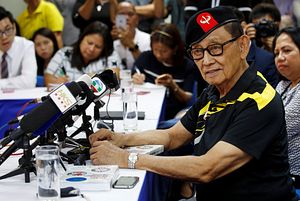Shortly after an international tribunal awarded the Philippines a sweeping victory in its legal case against China’s actions and claims in the South China Sea, Philippine President Rodrigo Duterte signaled his willingness to seek bilateral talks with Beijing on the issue. In particular, he tapped former President Fidel Ramos as a special envoy to China, a position Ramos accepted after initially expressing concerns about his health.
The 88-year-old statesman has now begun his duties as the Duterte administration’s point-man on China talks. On Monday, Ramos left for Hong Kong, where he will spend five days speaking with “old friends,” as he, the Philippine and the Chinese governments have all put it. That makes Ramos’ visit effectively a very high-profile “Track II” dialogue – one retired official meeting with other retired friends for unofficial (but government-approved) talks. The hope is that the talks this week – with as-yet-undisclosed Chinese partners – will lay the groundwork for official dialogues in Beijing at a later date.
Ramos is taking a slow-but-steady approach to rebuilding ties between the Philippines and China, which have been badly damaged by the row over the South China Sea. Before departing, Ramos described his visit as an “icebreaker” designed to “rekindle ties with China.” That means he will focus on areas of cooperation, and avoid talking about controversial issues – including the South China Sea ruling. “That is not my mission,” Ramos told reporters in Manila. “[…] It is not me who will raise that issue.”
That’s in keeping with the approach favored by the Duterte administration. Presidential spokesperson Ernesto Abella said the idea was to take “a very diplomatic route”: “[T]hey can start with things you can agree on and not necessarily begin from an adversarial or insistent position.”
Instead, Ramos said he would focus on areas of cooperation, including tourism and joint fishing in what he called “the common fishing ground,” areas within the Philippines’ exclusive economic zone but claimed by China as “traditional fishing grounds.”
China has taken a cautiously optimistic stance to the former president’s visit. Chinese Foreign Ministry spokesperson Hua Chunying said in a statement that “The Chinese side is open to all forms of contact between the two sides and welcomes a visit to China by Mr. Ramos as a special envoy at an early date.”
“China and the Philippines should make joint efforts to improve bilateral relations, restore dialogue and cooperation, and push for the sound and steady growth of bilateral relations,” Hua said.
Earlier, a commentary published in Xinhua said that Ramos’ visit brought “a whiff of hope” for future negotiations over the South China Sea. Author Wang Haiqing said that Ramos’ “long history of friendly exchanges with China … gives him a unique advantage in helping revive chilly bilateral ties.” His trip to Hong Kong “could open a new chapter in settling disputes,” the commentary argued.
However, Wang also cautioned against too much optimism, saying that the success of the venture “depends largely on the sincerity of the Philippines.” The article makes clear how the Philippines can prove that “sincerity,” namely by disavowing the July 12 arbitration ruling. As Wang put it, repeating the standard Chinese position, “the Manila-initiated arbitration case is nothing more than an abuse of international law and the deeply biased ruling on the case should have no place whatsoever in future bilateral talks over the South China Sea issue between China and the Philippines.”
The arbitration case was originally brought in 2013 under the previous Aquino administration, leading to hopes in Beijing that it could convince the new Duterte government to distance itself from the ruling. However, the Philippines has already rejected an offer of bilateral talks with China that was based on the precondition of ignoring the tribunal’s award. Philippine Foreign Secretary Perfecto Yaway said he had made it clear to his Chinese counterpart, Wang Yi, that “this is something that was not consistent with our constitution and our national interest.”
If China keeps that precondition for bilateral talks, then, Ramos’ trip in Hong Kong might not be able to truly break the ice after all. However, he may have some success in other fields, if both sides are willing and able to decouple progress on economic ties, for example, from the sensitive South China Sea issue.

































